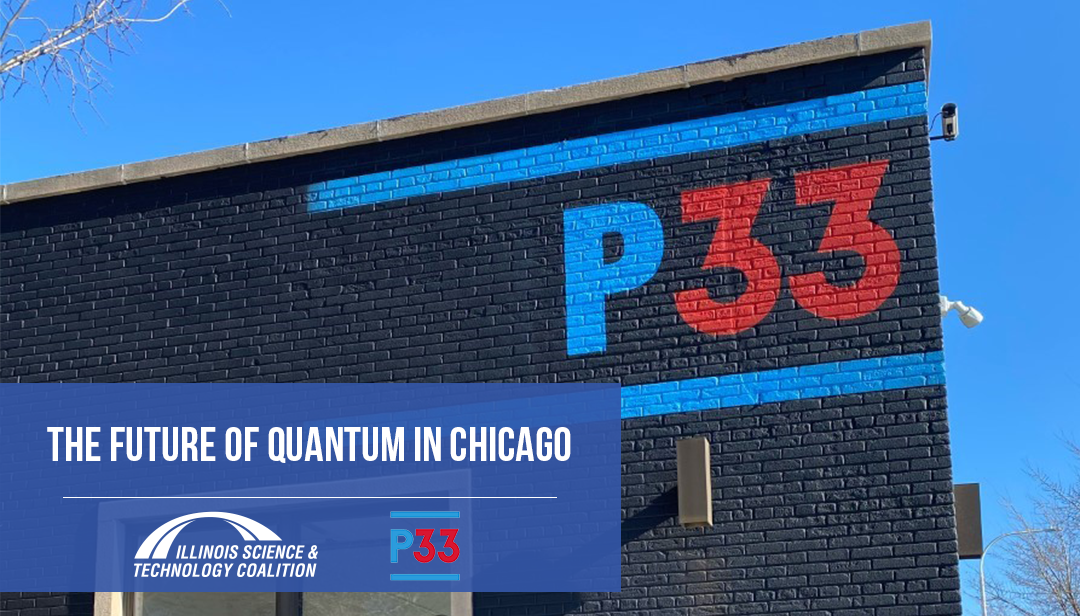In May’s Catalyst, we partnered with the Chicago Quantum Exchange (CQE) to explore the evolving landscape of Quantum Information Science (QIS)—including how Illinois researchers are learning to harness the technology and building relationships with industry along the way. Beyond CQE, there are several other supporting organizations helping to position Illinois as an important hub for QIS research and commercialization. One such organization is P33, an industry-led initiative to grow Chicago as a tech hub.
In this Catalyst Conversations, we hear from Michelle Hoffmann, SVP, Health and Life Sciences about P33’s growth and their mission to make QIS a key part of Chicago’s tech future.
Subscribe to get the Catalyst newsletter sent to your inbox.
1. Before we dive into P33’s work on quantum, update us on P33’s progress. How has the group evolved since it was announced in 2018?
So. Many. Ways. P33 concluded its first year of operations on June 30, 2020. Year one focused on transitioning from “P33 the initiative” to “P33 the organization.” We solidified our foundation by hiring our first wave of domain leaders, refining our strategy based on extensive research and discussions, engaging several hundred stakeholders, and establishing an expanded Board of Directors. In parallel, we turned strategy into action resulting in impactful “wins” for the Chicago tech ecosystem and P33 in our first year, within the backdrop of COVID-19.
Former Boston Consulting Group executive, Brad Henderson, stepped into his role as CEO in July 2019 and met with nearly 200 senior leaders across Chicago in his first month sharing ideas and gathering feedback. Within a few months we hired nine additional team members. Like all good agile startups, as we waded through the gigabytes of materials that preceded our arrival, we narrowed our strategy down to precise programmatic initiatives that we feel will accelerate Chicago’s trajectory towards a global, leading, and inclusive tech hub. We are focusing on Ventures, Talent, and Deep Tech. My area of focus on Deep Tech nicely encompasses data and analytics, artificial intelligence, and, importantly, QIS. While my original title was ‘Health and Life Sciences’, my mandate became, simply, “Science.”
As we nailed down our strategic roadmap this past March, in that same breath COVID rapidly started shutting down our region, state, nation, and the world. The principles around which P33 was organized –agility, connectedness to academia and industry, civic responsibility, grounding in technology and science – were put to the test. Over the past few months our team has been working tirelessly to apply the core of what we do – partnering with diverse institutions and communities to address an urgent challenge – to the COVID-19 crisis. We took an exhaustive look at our 2020 priorities and identified areas where efforts needed a heightened focus, as well as those areas where today’s climate makes the work difficult or less relevant at this time.
Our focus on QIS was put to the side while we helped stand up a COVID Data Commons, helped the community understand how to integrate technology into COVID contact tracing, developed an upskilling program for those whose employment was impacted by the pandemic, and monitored new COVID test technologies. We are proud of how our city has come together across various sectors to stand up in the fight against COVID, and our role in those great feats. As our economy starts to reopen, our team too is beginning to shift focus back on our original initiatives including QIS, albeit in a new normal of virtual meetings.

Michelle Hoffmann, SVP, Health and Life Sciences, P33
Our research showed a gap in translating science into commercial impact in Chicago. Specifically, QIS could transform industries and Chicago could become a center of gravity for this revolution. We have an opportunity to use our best-in-class QIS capabilities to develop Quantum-Industry solutions. Simply, Chicago has the potential to ‘win’ at quantum, but we need to make the right investments now. This is one of many gaps where P33 is taking action to turn Chicago into a tier 1 tech hub.
3. P33 has also identified food and agriculture, Industry 4.0, health and life sciences, and data and platform businesses as its areas of focus for Chicago’s future. How does QIS fit into those focus areas and what role does it play in the region’s future?
When we came in as an organization, we realized that the sector focus, while important, should be subsumed by the innovation assembly line. Rather than focus on the sector, we needed to think about how innovations came to be and the same infrastructure that would bring about life sciences supremacy – the ability to translate and commercialize scientific advancements – could be applicable to any and all tech innovations like QIS. So rather than focus on a sector, we have chosen to put these sectors under the umbrella of our platforms such as Deep Tech.
4. What strengths does the Chicago region possess in quantum? Where are the gaps that need to be filled for quantum to become a key part of Chicago’s tech future?
The biggest gaps are the lack of industry-academic interactions and lack of capital. We have to turn esoteric QIS into industrial applications and commercial ventures. Chicago has no problem generating cutting-edge science. But when it comes to realizing the applications and the resulting economic benefits, our risk aversion and dearth of capital means we lose those rewards to the coasts where capital exists, and experienced entrepreneurs know how to discharge technical risk.
Illinois universities and researchers contribute amazing advances in artificial intelligence, computer sciences, materials, energy, and life sciences; yet from a commercialization standpoint, we are playing catch-up. While our industrial economy was supporting us, we let go of the opportunities afforded by the innovation economy. With QIS in its infancy, we have a window of time to seize the advantage. In addition, among our four Tier 1 universities and two national labs, we lead the nation, if not the world, in the specific academic ecosystem of QIS. The complexity and diversity of our academia and research ecosystem is incredible. Illinois has the unique mix of necessary systems computer scientists, theoreticians, algorithm specialists, physicists, and materials scientists. Chicago also possesses the industrial base where QIS use cases are expected to be transformative – health care, life sciences, financial services, transportation and logistics.
With these advantages and a communal will, we do not have to cede first place to Pasadena, the Bay Area, Toronto, and Boston.
5. What role does the private sector play in the growth of QIS? And how does P33 plan to support the development of QIS in the Chicago region?
At P33, our first goal is to use our academic resources and significant industrial base to push forward collaborations to uncover real QIS use cases. Our team is working on curating these industry-academic touchpoints. There is a phenomena of experimentation and error that businesses need to move through in order to realize the value of new technologies. We know corporate behemoths like JP Morgan, WalMart and Ford are already working with startups and universities and experimenting with QIS use cases, and we want to make it easier for our industry partners – Morningstar, Coyote, CME Group to name a few, to move through that cycle.
Our second goal is to make sure this trial and error cycle is repeated, but for new commercial ventures like startups. We want to make sure that the young QIS talent that cycles through our universities stays in Chicago/Illinois and launches their QIS ideas here. We are early in the evolution of QIS, and many of these ventures will probably fail. Over time the entrepreneurial engineers and scientists who leave these companies will now have roots here in Chicago, rather than the Bay Area or Boston. They will eventually start anew, armed with invaluable experience that will eventually become commercial success. We aim to get these commercial pioneers the capital they need to start their first company here in Chicago.

